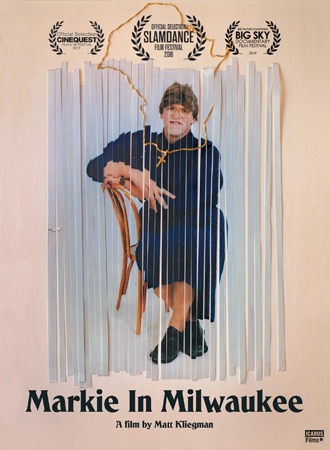
Markie in Milwaukee 2019
Distributed by Icarus Films, 32 Court St., 21st Floor, Brooklyn, NY 11201; 800-876-1710
Produced by Matt Kliegman, Zac Stuart-Pontier, Morgan Z. Whirledge, and Andrew Moynehan
Directed by Matt Kliegman
Streaming, 88 mins
Middle School - General Adult
Family Relations; Gender Identity; Transgenderism
Date Entered: 10/27/2020
Reviewed by Kathleen Spring, Nicholson Library, Linfield University, McMinnville, ORMarkie Wenzel began her life as Mark Wenzel, a Midwesterner who became a Baptist preacher, married, and started a family while simultaneously wrestling with issues of gender identity. In her mid-40s, Wenzel decided to come out as a transgender woman and take her transition public, a process that ended her marriage and seriously affected her relationship with her children. In Matt Kliegman’s documentary Markie in Milwaukee, we witness the impacts of Markie’s decision to live as her true self and the toll that takes on both her and her family.
Kliegman utilizes a wealth of footage, shot mostly in vérité style over the course of a decade, to tell Markie’s story. The filmmaker also incorporates archival footage and photos from Markie’s childhood, as well as formal interview footage with others from Markie’s life, including church pastors and one of her doctors. We see Markie’s early days of transitioning beginning in 2008, as she grapples with how to present her 7-foot tall body as feminine and documents her progress through photo booth snapshots. In the ensuing years, we witness other struggles for Markie, such as missing out on milestone events like the birth of her grandchildren and deciding whether to go through with transition surgery.
What makes Markie in Milwaukee a particularly unusual film about transitioning is the narrative twist Markie herself provides: right before her surgery, she decides to abandon her transition and return to living as Mark. Wenzel wonders aloud about this choice to stop and “go back,” recognizing that even as she seeks to rewind, things won’t be the same because everyone else has continued to move forward. Kliegman explores this second transition for Wenzel with equal depth and care.
Although the sometimes shaky vérité footage can be distracting, there is much to celebrate in Markie in Milwaukee. The film makes it clear that life is a continual growth process and that people can be infinitely more complicated than the binaries imposed by society. Markie in Milwaukee would be beneficial for both public and academic libraries and is appropriate for courses in gender studies, family studies, psychology, and sociology. Pairing it with other recent films on transitioning, such as From This Day Forward (2015) and Coby (2017), would reinforce for students that every story is different and deserves to be told.
Awards:
Grand Jury Prize Honorable Mention, Slamdance Film Festival